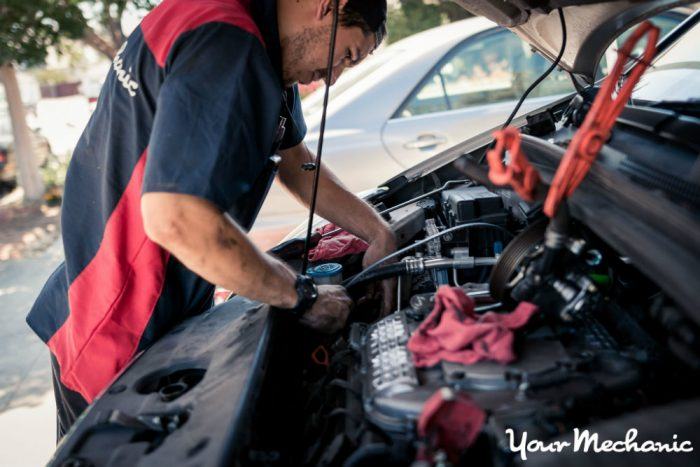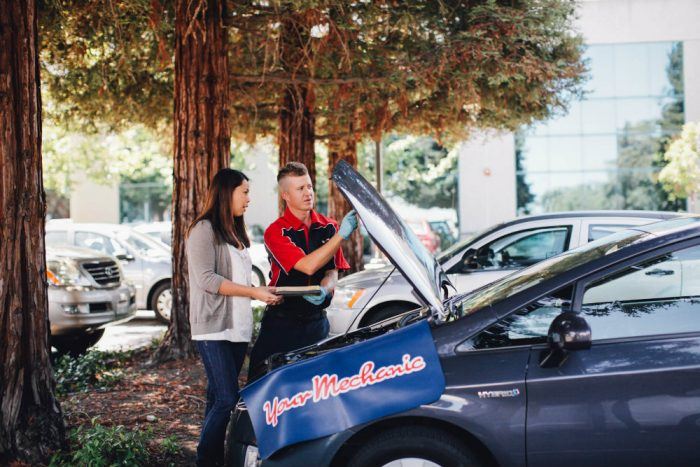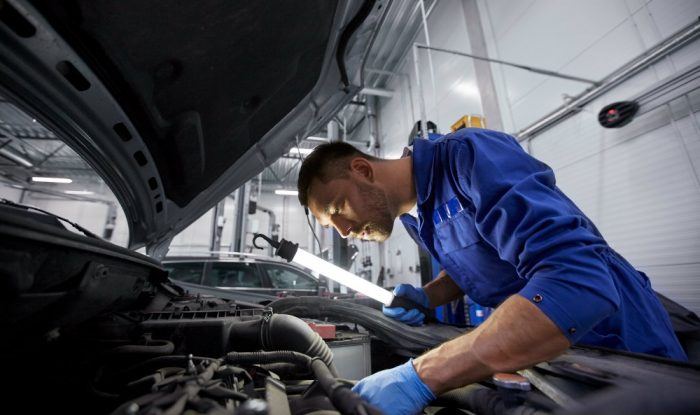In today’s automotive climate, “disruptor” is term appearing more often. Dictionary definitions paint the word in a negative light, until it’s used in a business environment. When applied here, a disruptor is someone implementing new products or services, proactively seeking the next emerging market. These approaches can appear crazy at first, but when executed properly, they often prove remarkably innovative.
For example, the Toyota Prius was considered a disruptor when it debuted in 1997. The Ford Mustang was massively disruptive in 1964.
Inventive Ideas
The automotive landscape is changing rapidly and car ownership is evolving. What the future will look like exactly is still coming to fruition. Perhaps there will be more ride share models, maybe cars will drive themselves, maybe we hop in a teleport machine and wham, are suddenly at the local coffee shop. Anything seems possible now, but the market belongs to those who carry an intuitive, intelligent approach; it’s the price of entry to win the next generation of car buyers in an ever so technological world.
YourMechanic is one of these companies; a disruptor to the core with a business model that makes me say, “why didn’t I think of that.” YourMechanic’s approach is novel: they are a mobile car repair network accessed through the common smartphone. They cover over 600 maintenance and diagnostic services, are transparent and up-front on pricing, and have a presence in the 50 largest cities in the United States. The most important aspect of YourMechanic is how they go to their customers, and how those customers interface directly with the technician. Need an oil change but can’t leave work? No problem. They will come to the office. Need a tire rotation but have a child with the flu? No worries. They will show up in the driveway.
Emerging Trends
Although YourMechanic contrasts with the traditional car repair model, some dealerships are embracing their unique approach. Recently, YourMechanic unveiled a new product for dealerships and car lots that don’t, for whatever reason, have a service department. These pre-paid maintenance packages are rolled into the finance and insurance portion of the sale and are available for customers just like traditional service contracts. YourMechanic also spotted another trend: people traveling a considerable distance to purchase a vehicle. Maybe they can get a better price, or they are buying a particular make and model but the nearest dealer with that exact vehicle is a few hours away. That’s fine for purchasing the car, but what about maintaining it?
“With the customers being able to use the Internet, it’s getting harder for dealers to actually make good money on a sale; this is a challenger we are helping solve,” explained Rob Francis, Senior Director of Growth, YourMechanic. “Where they can make money is on the F&I (finance and insurance) side with services like prepaid maintenance packages. With the prepaid maintenance product, we saw a trend in the market where people were driving further for vehicles and dealers were saying it was hard to sell fixed F&I products to them because the customers won’t drive all the way back for service.”
Vantage Points
I learned the automotive business at a dealership, long before YourMechanic existed. I am, in my approach to automobiles, quite traditional. I sold cars, later a Service Advisor, then in management. I won’t speak for all dealerships – I spent my career with only one dealer group – but many will agree fixed operations or the “back end” is the most vital component of the business. A service department falls under fixed operations and the approach is such: sell the cars, especially the new ones, for as low as possible. Get customers in on price alone if you have to, delight them with exceptional sales conduct, get the deal, introduce them to the service department, and encourage them bring back not only the vehicle they recently purchased, but the others in their household. The other vehicles are key; those are the ones a dealership needs becasue they have miles on them. Vehicles with miles on them need things like sway bar links and transmission cooler lines. Maybe their other car has a nice door ding? That’s a job for the body shop, which falls under fixed ops.
One of the end goals of a dealership sales department should be to convert that buyer into a service customer. Fixed operations is a solid and accurate health barometer for any given dealership. However, for the local lots and independent dealers, competing with the Internet and without the traditional back end to capture additional profit, a pairing with YourMechanic is fitting. Those dealers can now provide, albeit in a different fashion, an effective way to service the vehicle after the sale.
“We bring the shop from the dealership and to the customer essentially; the pre-paid maintenance products came from the current treads and customer and dealership feedback,” Francis said.
Clearing The Clutter
Gary Pretzfeld is the co-owner of AutoTrust USA, a family-run pre-owned dealership located in Miami, Florida. They readily provide sales and service for area residents, yet some customers come from farther away in Florida or even other states to buy a vehicle. AutoTrust USA is a prime example of how a disruptor, like YourMechanic, is helping a traditional automotive enterprise serve customers outside their normal business radius.
“Post-sale if the customer has any issues that need to be resolved, YourMechanic can provide better customer service than the competitors by sending a mechanic out to the customer’s home or office,” he said.
It may seem YourMechanic and a traditional dealership service department are worlds apart. However, both entities must take care of the customer by fixing their vehicle – that’s the lowest common denominator. From my own experience, I can attest to how busy and backed up a service department can get. This is where YourMechanic starts to bridge the gap between the conventional approach and the disrupotor mantra. Dealer principals like Pretzfeld are inclined to implement effective solutions to keep things running smoothly; the relationship for AutoTrust USA and YourMechanaic began after Pretzfeld sought more efficient, cost effective, and trustworthy solutions for the shop, especially during heavy volume times.
“Maybe a dealership has one or two mechanics on vacation, maybe they have a lot of warranty work to be done, or they are experiencing a seasonal high with more vehicles and simply need more hands around the shop,” Francis said. “We can basically act as a staffing agency and our skilled mechanics will work side by side with that dealership.”
“When you feel you can trust a partner it makes doing business much easier,” Pretzfeld commented.
Value Added Approach
YourMechanic will send one (or two or however many are needed) of their certified and experienced technicians to the dealership. The techs will show up, with their own tools in hand, ready to go. At reputable dealerships, cars recently taken in on trade make a pass through the service department in a process commonly called reconditioning. This often includes a multi-point inspection and oil change; components on the car, from the tires, belts, battery, brakes, an even light bulbs can be replaced before it heads to the lot. However, a service department inundated with work orders can just as easily pass that inspection work off to YourMechanic.
“Dealers can have their cars serviced and repaired on site, greatly reducing turn around time and insurance risk,” Pretzfeld explained. “The cars never leave the dealership so they can always be shown to prospective buyers.”
Although the business models are completely different – the dealership service department versus YourMechanic – when executed properly, it’s a solid symbiotic cycle that benefits the car buying public in the end. For two approaches to vehicle service and the automotive business in general that are sometimes so radically different, it’s not a half bad outcome.
“The inspection reports YourMechanic provides after each service are amazing tools to provide customers,” Pretzfeld said. “Once there is an inspection done on the car, the report is available to provide to a customer, which makes the sale process easier and increases value.”
Creative Collaboration
The entire idea here revolves around how tradition and disruption benefit from each other, if they recognize they are serving a similar population. That is not imply they need each other, but it is to say there is common ground. It doesn’t have to be a David and Goliath match where we pit the two entities against each other. While I won’t argue the founding principles of Capitalism or debate Adam Smith’s ideologies, sometimes collaboration as opposed to competition yields the best results. In the automotive business, things must be taken with a level of discretion: not every big dealership will stomp on little guys, and not every disruptor will stick it to the man. Personally, I am traditional. I believe in the dealership model and I adamantly support it. In the same breath, however, I wish I had thought of the YourMechanic concept.
“When we’re getting our products and services into new areas, we sometimes just don’t know, so we’re working and building with dealership proprietors,” Francis said. “We have consultants who work at dealerships to help us sort out these programs and to make sure they make sense for everybody.”
“We benefit in all departments by working with them,” Pretzfeld added. “Every dealer can benefit from working with YourMechanic.”
Carl Anthony is Managing Editor of Automoblog and resides in Detroit, Michigan.
from Automoblog.net http://www.automoblog.net/2017/07/12/collaboration-competition-dealerships-disruptors-working-together/
via IFTTT
from Tumblr http://peternpalmer.tumblr.com/post/162912722211
via IFTTT




No comments:
Post a Comment